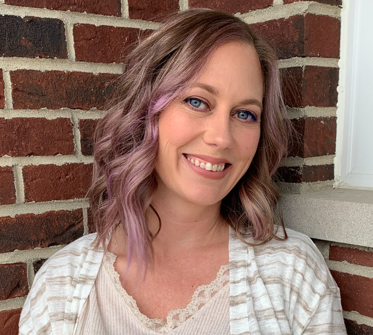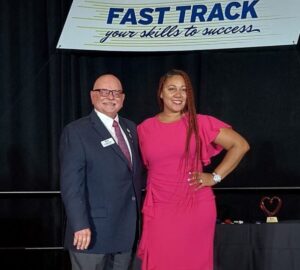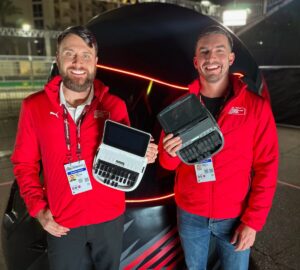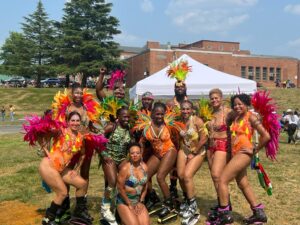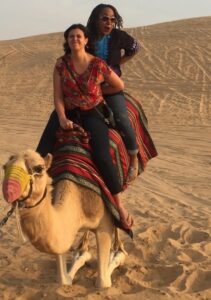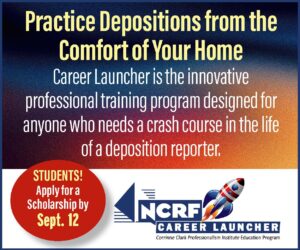By Chris DeGrazio
Holly Koch, RPR, a freelance reporter in New Lenox, Ill., sums up her first year as a professional in one word: exciting. “You literally never know what you’re walking into,” she says. “It could be a case about anything. There are also a lot of big personalities. There are so many new firsts. First job, first interpreter, first hearing, first order, first copy sale, first paycheck, first job over $1,000. It is all so exciting!”
CD | How did you get interested in court reporting?
HK | I first heard about court reporting from my aunt when I was in high school. I wanted to do the traditional college route, so that is what I did at first. That didn’t work out for me. I was waiting tables and still trying to figure out what I wanted to do. One of my coworkers was a court reporter! I told her it has always been in the back of my mind and asked her several questions about it. I immediately got so excited and went and toured a court reporting school in Chicago and started the next semester.
CD | Who or what inspires you?
HK | My husband, my children, and my entire family inspire me. They are what kept me going. But in the court reporting world, there are so many people who inspire me. I have to say, though, that all of the members of the 100-Day Practice Challenge are my biggest inspirations. I have learned so much from them, and they helped me get to the finish line of passing my RPR. The fact that some of them have been reporters for decades and still practice every day is so inspiring. They are constantly learning and growing.
CD | What’s something you’ve learned in your first few months of reporting?
HK | When I was in school, I solely focused on speedbuilding because I wanted to start working. I honestly didn’t know how to format a transcript properly. So the first few months, I was learning a lot with that. I was lucky to start with an agency who really guided me in getting things exactly right. I also started my career via Zoom, so there was a lot to learn in making sure all of my audio settings were correct and making sure I had backups.
CD | Where’s your favorite place to edit?
HK | My bed! I have a laptop desk and I love it! I find I don’t get as sore as when I am sitting at my desk. What a life – working from the comfort of my bed.
CD | Do you have a mentor?
HK | I do, and she is the best! Her name is Cynthia Conforti, RPR, CRR. Doug Zweizig, RDR, CRR put us in contact because we both live in the Chicagoland area and he thought we would be a good fit, and he was right. She let me sit in with her on remote depositions when I was in my high speeds. I got to see how it all went down in real life. She would also take me out to dinner and let me ask all the questions I wanted. I learned a lot from her.
I also have a handful of what I would call unofficial sponsors. Most of them are members on the 100-Day Practice Challenge page and they know who they are! They are always there when I need them. Court reporters are the most helpful people. It is nice to have a group of people whom you know you can go to for help. I feel like having a group of people is nice too because you are not always asking the same person.
CD | What do you enjoy most about court reporting?
HK | There are so many things! I love hearing something new every day. I am always learning. I think the best part for me, though, is being able to get my two boys ready and off to school in the morning. I only take jobs that allow me to do that. Once in a while I will take one where I have to get childcare in the morning, but only if I decide to or have someone available to help with them.
CD | Where do you see yourself and your career in five years?
HK | I hope to have more letters behind my name! I can’t decide yet if I am going to go for my CRR or my RMR first, but those are two certifications that I plan to achieve. I also see myself using a scopist so that I can spend more time on my writer as opposed to spending my days scoping as well.
CD | How did you feel both going into your first assignment as a reporter and coming out of it?
HK | I was soooo excited!!! I could not wait for that first job. Of course, I was nervous. But as soon as it was over, I just remember grinning and saying, “You did it.”
CD | What is your next goal?
HK | My next goal is completing another 100-Day Practice Challenge. I have completed two in the past. Since I have been a working reporter, I haven’t made it to 100 days again. I have tried a few times but I get too busy with pages or life gets in the way, and I have had to start over. But this year I am confident I am going to complete it! It is a way for me to continue to be a better writer every day.
CD | What is a long-term goal?
HK | My long term goal is to have my CRR and my RMR. I want these certs to not only make me a better writer, but the money potential is much higher with having these. Who doesn’t want to make more money doing what they love?!
CD | Where’s your favorite place to proofread jobs and why?
HK | Also on my bed!
CD | Do you have any advice for reporting students?
HK | Just keep going. It’s not easy. You knew it wouldn’t be from the beginning. That was one thing that was told to me over and over. It’s attainable, but it’s not easy, and you have to put in the work. Work on the things that are hard. It’s so easy to only practice the things that you’re comfortable with. It’s the things that you’re not comfortable with that are going to make you better. That was hard for me. I wanted to practice the fun stuff. When you know you have an area that you struggle with, work on that the most.
CD | Why did you choose to become a court reporter or captioner?
HK | I am a freelance reporter right now. I chose this because this is where everyone says the money is to be made. Money is not my only motivator to be a court reporter, but again why not make a lot of money doing what you love? I also really like the flexibility of it. You choose when you work and what jobs you want to take. Being new, I say yes to jobs I can that work with my family’s schedule. That way, I will see what areas are my favorite to take and hopefully can just focus on those types of jobs in the future.
I started out as a CART provider, and I really enjoyed that too. I am trying to get my feet wet in all areas, and then I can know what I want to do for the rest of my life.
CD | What was the hardest part of transitioning from school to the real world?
HK | Editing, for me, took a long time in the beginning. It still is time-consuming. So you have to learn how to juggle knowing how many jobs you can take and still allow enough hours in your week to scope and proofread. There was one point I had so many pages in my backlog that I was working 15 hours a day scoping them so they wouldn’t be late. That is a position I never want to be in again, so you just have to learn how long things are going to take and allow yourself enough time. My recommendation is to take a lighter workload in the beginning so that you don’t get in over your head.
CD | If you could sum up your first year in one word, what would it be and why?
HK | Exciting! You literally never know what you’re walking into. It could be a case about anything. There are also a lot of big personalities. There are so many new firsts. First job, first interpreter, first hearing, first order, first copy sale, first paycheck, first job over $1,000. It is all so exciting!
CD | What do you know now that you wish you’d known when you first started out?
HK | How much time it was going to take me to edit and produce transcripts. Like I said, I was pretty clueless about it. There were a lot of little rules that I needed to learn yet.
CD | Do you have any advice for reporting students?
HK | Just keep practicing! Everyone says that, right? It is so true! I was so lucky to find a group of students that were around the same speed as me toward the end of my schooling journey. We would meet on Zoom for two, one-hour blocks every day. I was and am still thankful for them. (Again, you know who you are!) They were my accountability. We all showed up every day, and it just became second nature. It was a place where we could ask questions, share briefs, and know that we were going to be writing for a minimum of two hours a day as long as we showed up. I recommend everyone getting a Steno Tribe!
CD | What’s your “can’t live without” item in your steno bag?
HK | I would have to say my Samson Go Mic, exhibit stickers, and business cards. You’re always going to need them!
CD | What was life like as a student?
HK | I started school at MacCormac College in Chicago, Ill. Starting out, it came really naturally to me. I made it to 160 wpm without having to retake a class. 180 wpm was my hardest speed. I was stuck there for a while and then I became pregnant with my first child. I started Simply Steno online and continued that throughout my pregnancy. After I had my son, I completely stopped steno altogether. I got so caught up in being a mom and felt like there was no way I could continue school.
Fast forward seven years and another son later, my husband and I were out to dinner one night, and we were talking about it. I told him that I had been considering going back to school. He was so encouraging and motivated me to go back. I immediately started getting everything in order, and I started Simply Steno again online. Steno was like riding a bike, and it only took me a few months to get my speed back up to 180 wpm. COVID-19 hit the world, my husband was home for a few months because he had to have surgery on a torn ACL, the kids were home, everyone was home. All of these things in the end helped me get to the finish line. My husband was there to entertain the kids, and I didn’t have to feel so guilty for being on my machine for so many hours a day.
I had the two hours where I met on Zoom with my friends to practice and there was also a high-speed Zoom group every night that I attended. So I was doing a minimum of three hours on my machine a day, usually more. It took me about a year and a half from when I started back after my seven-year hiatus to pass my RPR.
CD | What did you do to remain positive and motivated?
HK | Anything and everything I could try! I listened to a lot of motivational podcasts, listened to affirmations, tried hypnosis, exercised, read books, etc. With the world kind of shut down, there were a lot more tools to utilize on Facebook. Allie Hall, RDR, CRR did several interviews of reporters (a lot of them new) and that was a huge motivation. I liked to listen and learn about their stories and that helped. Doug [Zweizig] also did some live interviews. Only a certain number of students could attend, and I signed up for every single one. I basically said yes to anything that anyone asked if I would like to join or try.
CD | What is your biggest challenge as a new reporter?
HK | Scoping! But I am already so much better than when I started, and I am only six months in. I can’t imagine where I will be at in another six months!
CD | What’s the coolest experience you have had working in the profession?
HK | There are so many different cool aspects to it, but I think the day that was really exciting for me was when I took my first court hearing. There was just something about being in downtown Chicago on the 25th floor overlooking the city, taking my machine in and setting up and taking down proceedings in front of a judge. So much has been on Zoom that all of my in-person firsts have been exciting.
CD | How do you maintain a healthy work/life balance?
HK | I am still working on that, but I have gotten much better already! Like I said already, you have to take into account your work time both on and off the record. If you’re on the record for five hours, it will probably take you at least five more hours to scope. I want to have time for myself and my family too. When I was working crazy long hours, I was not loving it as much as I should be. I was getting burnt out. I don’t ever want to resent this career, because I love it so much. So now I just make sure I don’t say yes to too many jobs or make sure that I am in a place where I want to be working as much as I am.
Chris DeGrazio is a freelance reporter in Fort Pierce, Fla.
